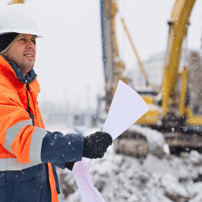Winter Construction Hazards
January 24, 2018 Construction workers face risks of serious and fatal injuries daily, but winter brings even more safety concerns to those in the profession. Exposure to cold temperatures and icy or slippery work surfaces and roadways can lead to accidents and injuries. Rooftops covered with snow, downed electrical wires, and driving accidents pose unique hazards to construction workers during the winter weather from November to March, each year. Knowing how to recognize winter hazards can help prevent the serious and sometimes fatal injuries that can occur.
Construction workers face risks of serious and fatal injuries daily, but winter brings even more safety concerns to those in the profession. Exposure to cold temperatures and icy or slippery work surfaces and roadways can lead to accidents and injuries. Rooftops covered with snow, downed electrical wires, and driving accidents pose unique hazards to construction workers during the winter weather from November to March, each year. Knowing how to recognize winter hazards can help prevent the serious and sometimes fatal injuries that can occur.
Winter Hazards for Construction Workers
Freezing temperatures can result in frostbite if construction workers are not wearing thermal layers to protect their face, hands, and feet. Wind burn can occur on exposed areas, causing serious levels of skin damage. Many construction workers may be required to shovel or remove snow that impacts a work zone. Back injuries, heart attacks, and dehydration can occur when workers over stress their bodies by working in frigid temperatures while straining their back, leg, and arm muscles. Warming up before beginning snow removal, taking frequent breaks in heated areas and drinking warm beverages can help reduce the risk of injuries during these activities. While snow blowers can relieve stress on the body, amputations and serious injuries can happen when hands or feet encounter moving parts.
Driving on icy and snow-covered roads pose a hazard to everyone, but construction workers that are driving heavy trucks or operating heavy equipment are at an increased risk for serious injuries. Employers must ensure that their employees are properly licensed and trained to operate construction vehicles and equipment, especially in winter conditions. Routine maintenance and inspections should be done on all construction vehicles to ensure that they are working properly and can withstand the stress of cold temperatures. Vehicles should also have a winter emergency kit onboard for workers that may become stranded. These kits should include shovels, tow chains, windshield ice scrapers, snow brushes, jumper cables, a flashlight with extra batteries, and non-perishable snacks, water, and blankets.
Safety Tips
For those working in construction work zones on highways, interstates, and roadways, the risk of being struck by passing vehicles increases in winter weather. Icy roads and snow patches can cause vehicles to skid or slide into a construction work zone. Barriers that include light-reflective signs, cones, barrels, or fencing, and workers wearing bright, reflective vests can help lower the risks of accidents in these areas.
Proper training on how to avoid slips, trips, and falls on icy surfaces, and how to work safely with or around downed wires and trees are also essential to worker safety. Electrocution, broken bones, and back and head injuries are serious consequences that can result from working in these conditions. Construction workers that are properly trained and have access to protective safety gear can lower their risk of serious and sometimes fatal injuries.
Philadelphia Construction Accident Lawyers at Galfand Berger LLP Advocate for Construction Worker Safety
If you have been injured in a construction accident, you may be entitled to compensation. The Philadelphia construction accident lawyers at Galfand Berger LLP are committed to helping injured construction workers claim the maximum amount of compensation available. Call us at 800-222-8792 or contact us online to schedule a consultation today. Our offices are in Philadelphia, Bethlehem, Lancaster, and Reading, and we serve clients throughout Pennsylvania and New Jersey.
 Google Screened
Google Screened
